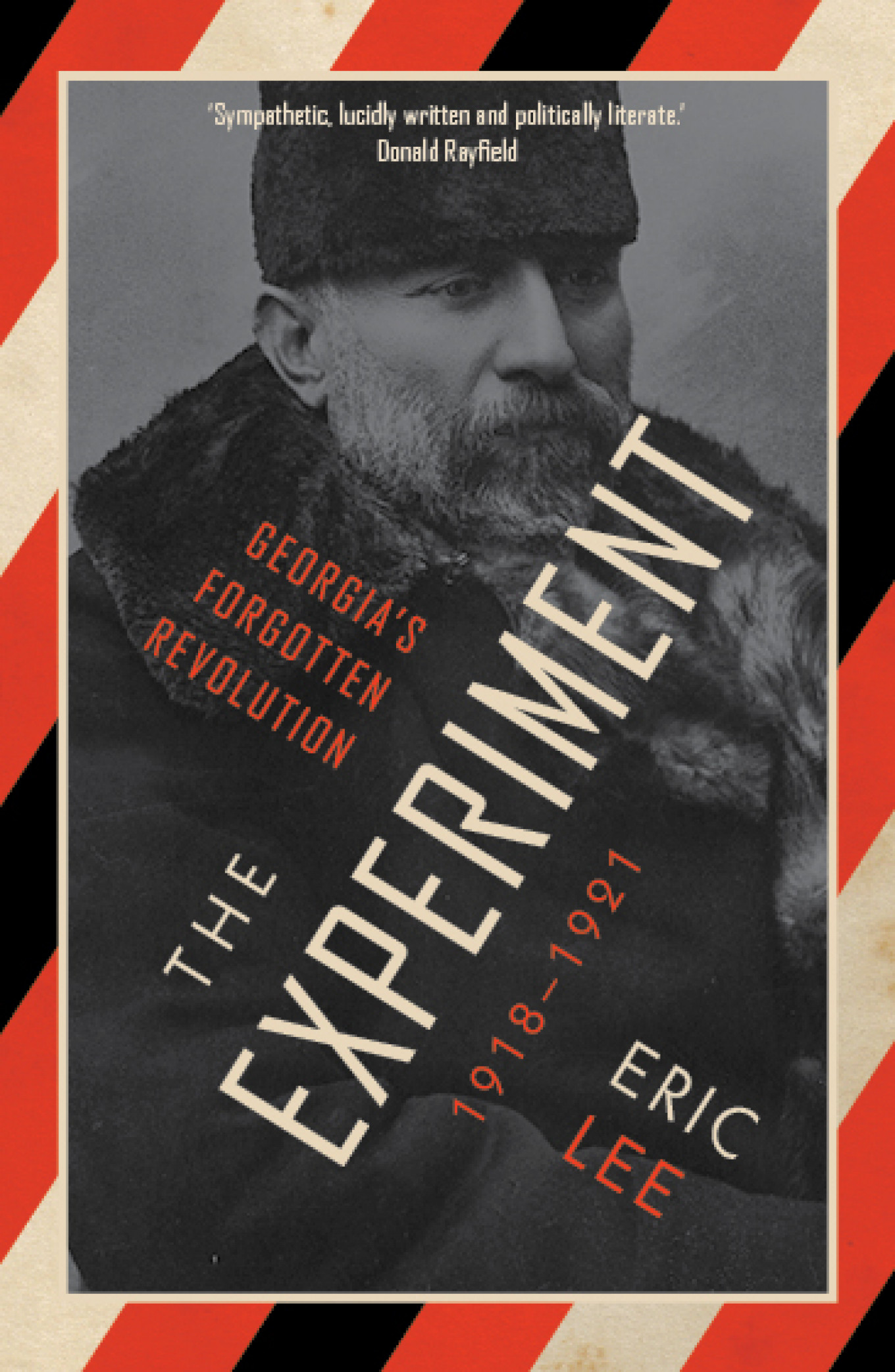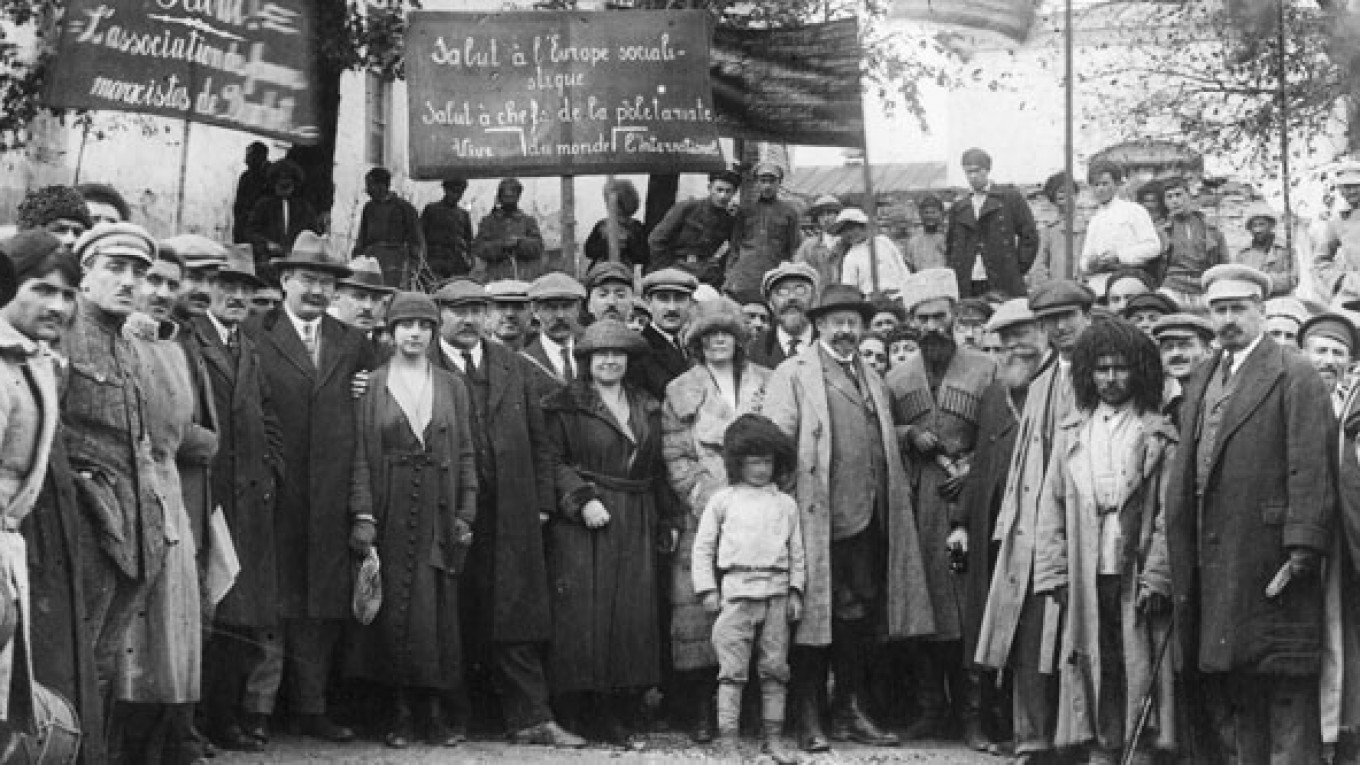In January Eric Lee came to Moscow to present the Russian translation of his book, “The Experiment: Georgia's Forgotten Revolution 1918-1921.” This followed the Georgian translation that was released the previous year. At Memorial International, Lee discussed his book with Russian and Georgian scholars, many of whom knew virtually nothing about the history he reported. The highlight of the evening was a connection by Skype to talk with Redjeb Jordania, the 99-year-old son of the first leader of the Georgian Republic, Noe Jordania.
The Moscow Times had a chance to talk with Lee about Georgia’s short-lived, but successful experiment in democratic socialism, Russian foreign policy over the centuries, the reception of the book in Georgia and Russia — and why he hopes there will be some good fights about it.
The interview has been edited for brevity and clarity.
Q: For three years Georgia had a peaceful and successful democratic socialist republic that ended in 1921 when Bolshevik Russia attacked. How was this forgotten?
A: This “forgotten history” was actually very, very well-known at the time. If you were a socialist in 1920 anywhere in the world — and certainly anywhere in Europe — you not only knew about Georgia, you probably knew the leaders of the Georgian Social Democratic Party. They were very famous individuals at that time.
It wasn't forgotten in a natural way that things get old, so we forget them. It was deliberately forgotten. It was erased by Leon Trotsky and the Stalin regime. I don't think Trotsky had a particular antipathy to Georgia, I think he hated the Mensheviks. He couldn't stand the fact the Mensheviks were right; they anticipated his anti-Stalinism…
But I'm not sure how much Trotsky believed what he was writing [in his critical book about Georgia]. According to the history, he wasn't involved in planning the invasion of Georgia. He claimed not even to know about it. But Stalin pulled off this invasion of Georgia, and he felt as a member of the Bolshevik party, a leader of the government, the obligation to defend it.
Q: One of the things that struck me was the extraordinary repetition of history, the way Russia played Abkhazia and South Ossetia against the Georgians, signed a peace treaty and then attacked. Is that kind of literal repetition unusual?
A: Not at all. There was kind of a Bolshevik Stalinist template for how you do this. You announced that the revolutionary government of the country had issued an appeal to the Red Army to come in. Actually, it predates the Bolsheviks. For example, the Christians in the Balkans supposedly issued appeals for the Russians to attack the Ottoman empire to save these poor embattled Christians. This is classic Russian foreign policy that predates the Bolsheviks, was carried on by the Bolsheviks, and continues even now.
Q: Could you talk more about why the Georgian republic was successful? When you cite the few places where there were successful experiments with democratic socialism, they're always very small places. Do you think that is an important factor?
A: The short answer is I don't know. But I don't think there's anything intrinsically important about the smallness of it. I think what made Georgia special was that it had this incredible social democratic party with great leaders, like Noe Zhordania who figured out what to do and followed Orthodox Marxist principles. They were totally unoriginal. They invented nothing, they just simply read Marx, figured out what they were supposed to do and did it, and it worked. It was smarter than that, but they really were Orthodox Marxists.
Q: You don’t speak or read Russian or Georgian, and yet you wrote the first popular history of this period. How has it been received?
A: Everybody in Georgia likes my book; I never heard a critical word in Georgia. Lots of favorable reviews, several events, members of parliament and others introducing me to crowds. There's a wonderful sense that it serves a national purpose. My translator was very thrilled to translate my book into Georgian. She said that, "Eric Lee has given a gift to the Georgian people."
I was very moved by that. The reaction in Russia is going to be very different. The organizers in Moscow said there were people on Facebook who hadn’t read the book but were very critical of what they perceived would be my bias.
I think it's the general hostility toward democratic socialism, toward Georgian Menshevism that predates publication of my book. I think people don't want to read a book that's going to contradict what they already believe about Georgia.

Q: Is the problem that you aren’t Russian or Georgian?
A: Actually, until 1990 the great historians of the Stalin era were all foreigners. In a place like Georgia, that's still true. They don’t have historians who have been doing this work for decades. They have young historians who are just starting. Maybe in 20 years when a new generation will come along that will change, but right now they absolutely need historians from the West who had access to materials for decades. And I was never raised in Soviet mythology.
Having heard that there's been some criticism online in Russia by people who haven't read the book, I have to say I'm thrilled by that. I’d love for there to be a discussion about this. It’s a discussion that has to take place in Russia. People have to talk about the true history of the country, the Stalin years, to look at the Bolsheviks when they were still considered to be good guys. This is 1921, before the horrors of the totalitarian regime. And yet it's a terrible story. How could they crush this Georgian experiment?
I welcome debate. And I think people should read the book, should criticize it, should debate it and challenge it. And it should be a public discussion about what democratic socialism is and why socialism is such a bad word. We know why, but it doesn't have to be that way. There was an alternative. It didn't have to turn out the way it did.

Excerpt from Chapter 12
Europe’s Socialist Leaders Come For a Visit
In August 1920, a delegation of European socialists set out to “investigate political and social conditions” in Georgia. Almost all had recently visited Bolshevik Russia, so that they were qualified to compare the two countries.
The delegation consisted of the most renowned and respected socialists in Europe: Karl Kautsky, Emile Vandervelde and Camille Huysmans. They were joined by James Ramsay MacDonald, leader of the British Labour Party; Tom Shaw, Labour MP from Preston; Ethel Snowden, a Labour Party leader who served on its National Executive Committee and had written a book critical of Lenin’s regime after a trip to Russia.
The French members of the delegation to Georgia included socialist and trade union leaders Pierre Renaudel, Adrien Marquet and Alfred Inghels. The Belgian delegation consisted of Emile Vandervelde and his wife Lalla, Louis de Brouckère and Camille Huysmans, accompanied by his wife Marthe and daughter Sara, who acted as secretary to the delegation.
***
Ethel Snowden, who had previously been to Bolshevik Russia and could therefore make comparisons, has provided us with a very detailed account of the visit, including that first day in Batumi. It gives a real flavour of how the international socialist delegates were greeted by the Georgians. She recalled what it was like for her to visit Bolshevik Russia.
In Georgia it was different. The experience in Batoum was the same everywhere. There was no compulsion to meet us. The people came because they wanted to come. They moved freely amongst us, without restraint of speech or manner, laughing, shouting, singing. The brown-eyed children climbed into our laps. They shyly played with our watches or examined our clothes. In all those merry faces turned up at us on the balcony I saw not one look of bitterness, no tightening of thin lips, no burning hate in the eyes. One jolly giant, whose curly grey-black hair waved a head’s breadth above the crowd, led the cheering, which was caught up by the crowd in unmistakable sincerity. They ran by the side of our carriages, flinging red roses into them and blowing kisses to us as we gathered up the roses and pinned them to our coats as the red emblem of international solidarity.
They stayed only one day in the port city. Sara Huysmans was sad to leave Batumi:
The party was delighted … but had to move on, boarding the train again and sleeping in solid hammocks, on its way to the Georgian capital Tbilisi. Unfortunately, they did not enjoy a good night’s rest … At every station in which the train halted the delegation had to hear out the local variant of The International and greet an enthusiastic crowd. It went on all night!
Ethel Snowden recalled that their train
had been a royal train. It was replete with every comfort. There were bathrooms even, and an excellent kitchen. The food department was in the hands of a Russian family, a widowed mother and three children. They were a family of good birth whose fallen fortunes had been relieved in this way by the Social Democrats as a reward for saving the life of the President, always in danger from the violent extremists of both sorts.
They finally arrived in Tiflis. “It seemed very odd,” wrote MacDonald.
There we were, having left for some days all that seemed to be of the West, having gone through the Bazaar and the mosques of Constantinople and proceeded far beyond towards the rising sun, and, at our journey’s end at last, we were being received by a President of the Republic of Georgia in a waiting room at the Tiflis railway station, covered with the most glorious Oriental rugs, but hung with the portraits of Karl Marx and his best known disciples.
Snowden described the cheering crowd that awaited them before they left for their quarters in the former residence of the American commissioner. According to Sara Huysmans, “The welcome they were given in Tbilisi was even more splendid than in Batoum. There were speeches again, and cheers and toasts, but now they had to get down to business."
That business included, according to MacDonald, a meeting with the Social Democratic Party’s Central Committee followed by a visit to the opera. Snowden wrote that the delegation’s “first business in Tiflis was to attend the special session of Parliament called in our honour, to hear a speech of welcome from each of the eight political parties represented in that Parliament.”
After three days in the capital, they were taken around the country, accompanied by journalists and even someone with a movie camera. According to Sara Huysmans, “the delegation worked long hours, from 7 a.m. to 2 a.m.” Her father proposed concrete measures to intensify cooperation between the Belgian labour movement and the Georgians. “Huysmans had ambitious plans to establish solid cooperation with Belgium,” she wrote. “He would arrange for the shipping of Georgian vegetables and fruit to Belgium, and of course to Antwerp in particular. Belgian cooperatives could sell them to their customers. Well-trained Belgian technicians had to be sent to Georgia urgently to share their expertise in order to make production more efficient and improve technical education.”
MacDonald described visiting “the heart of the Caucasian mountains, surrounded by the wildest and the gayest rout of untamed mountaineers armed with sword, shield, and rifle” and then standing reverently “whilst an old priest by the light of altar candles guttering in the wind read to us an address of welcome which ended with ‘Long live the International.’”
“In every one of the numerous villages which I visited,” he wrote, “and from the still greater number of peasant deputations that came offering us wine and bread and salt, I heard of nothing but satisfaction, nothing but hope.”
Ethel Snowden described hearing MacDonald speak to the Georgians at that church:
The old church in which the address of welcome was to be delivered was too small for the company assembled. We held the meeting in the churchyard and spoke to the people from the top of a broad wall. I never heard Mr. MacDonald speak better than he did to those grim but simple mountain warriors, reminiscent as they were of the shaggy Highlanders of his native Scotland three centuries or more ago.
A number of the visiting Socialists commented on the way in which the local nobility had acquiesced in the Social Democratic reforms. “I met Princes who gloried in their new-found civic equality,” recalled Ramsay MacDonald. Ethel Snowden “met landlords who submitted cheerfully to the new system and noble ladies who rejoiced in their new-found economic liberties.” Sara Huysmans wrote that “large landowners had been disinherited with little difficulty.” They found none of the bitter class warfare that had torn Russia apart in the years following the Bolshevik coup in 1917. This was partly due to the specific character of the landed nobility in Georgia. Many of the local Georgian aristocrats were hardly richer than their peasant neighbours, and many had been resentful of the Russians, welcoming Georgian independence. Some of the Georgian Menshevik leaders were themselves descended from the nobility, Zhordania included. This, and the broadly pro-peasant policies of the Georgian Mensheviks as compared to the Russian Bolsheviks’ focus on the urban working class, contributed to the different results in each country.
Note: For ease of reading, footnotes have been deleted from this section.
Excerpted from “The Experiment: Georgia's Forgotten Revolution 1918-1921” by Eric Lee, published by Zed Books.
Copyright © Eric Lee 2017
Used by permission. All rights reserved.
For more information about Eric Lee and his book see the publisher's site.
A Message from The Moscow Times:
Dear readers,
We are facing unprecedented challenges. Russia's Prosecutor General's Office has designated The Moscow Times as an "undesirable" organization, criminalizing our work and putting our staff at risk of prosecution. This follows our earlier unjust labeling as a "foreign agent."
These actions are direct attempts to silence independent journalism in Russia. The authorities claim our work "discredits the decisions of the Russian leadership." We see things differently: we strive to provide accurate, unbiased reporting on Russia.
We, the journalists of The Moscow Times, refuse to be silenced. But to continue our work, we need your help.
Your support, no matter how small, makes a world of difference. If you can, please support us monthly starting from just $2. It's quick to set up, and every contribution makes a significant impact.
By supporting The Moscow Times, you're defending open, independent journalism in the face of repression. Thank you for standing with us.
Remind me later.







